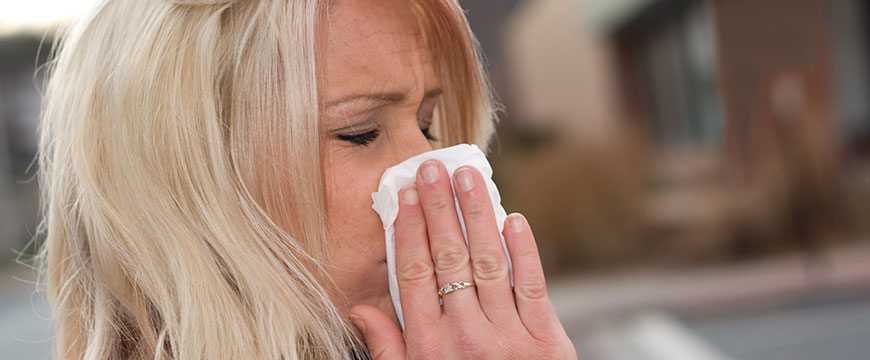
Allergies do not appear solely in the spring. The persistent sniffles, plugged nose, itchy eyes, and sneezing occur in the fall as well — and, according to allergy clinic experts, they’re becoming more widespread and intense.
How much do you know about fall allergies? Here’s what you need to know about the seasonal allergy surge and how to deal with it.
What causes fall allergies
Ragweed, a tall, willowy plant in urban and rural regions, is the most common cause of fall allergies.
This plant can produce one billion grains of pollen, which can irritate and inflame your sinuses. Ragweed blooms in August and normally peaks mid-September but might persist into November.
You will find ragweed in practically every state, although it grows in huge numbers on the East Coast and Midwest. Those who suffer from fall allergies might also blame mold for falling and decaying leaves, which can cause the same symptoms.
Many people don’t realize that allergy seasons have nearly doubled in length and intensity due to climate change. The increased CO2 emissions cause plants to produce more pollen, worsening allergies.
Furthermore, when temperatures remain higher for longer periods, and the first frost occurs later, plants such as ragweed have more opportunities to grow and emit allergens.
The urban heat island effect causes cities to have greater temperatures than suburban or rural locations. Densely packed buildings absorb and retain the sun’s heat, making it up to seven degrees hotter in urban areas during the day.
As a result, allergies tend to be more severe if you live in a city where higher temperatures allow ragweed to bloom for longer periods.
The difference between allergies, colds, and covid
Symptoms vary from person to person, but many people have the same allergy symptoms in the fall as in the spring. That means runny noses, sneezing, stuffiness, postnasal drip, and weariness all sound like cold symptoms and the prevalent version of Covid.
The only way to be sure you don’t have Covid is to take a test – but there are a few signs that can point you in the right direction. Viral illnesses emerge rapidly and then run their course, but allergies linger for four, six, or eight weeks at a time.
And, unlike colds, Covid, and the flu, allergies rarely induce fevers, body pains, or gastrointestinal symptoms like diarrhea.
Itchiness can indicate allergies, so watch for itchy, tingling ears, eyes, throats, and noses. Allergens in the fall can also create rashes similar to eczema.
Monitoring your allergy symptoms is critical, especially since allergens can provoke asthma attacks. Coughing, wheezing, and chest tightness are all indicators of asthma, especially if you wake up in the middle of the night with these symptoms.
If you feel winded, weary, or dizzy after light physical activity, such as housework, or if you cannot complete your typical exercise regimen, these could be symptoms of the condition.
How do you handle fall allergies?
Some simple habits help reduce the pollen you bring into your home. Close your windows as much as possible, especially on sunny, windy days with high pollen levels, and remove your shoes at the door.
When you go home, you should shower and change your clothes. HEPA air filters can aid in the cleaning of indoor air and the removal of mold and dander.
You should vacuum your home more frequently, especially if you have pets. You should vacuum it daily.
You should also clean your bedding regularly and keep your dogs out of your bedroom so they don’t track pollen onto your pillow.
Wear a hat and sunglasses to protect your face from pollen outside. (Masks may also help to alleviate symptoms.)
Medications are also an important instrument to use in your defense. Fluticasone and triamcinolone are over-the-counter intranasal steroids that can help relieve sniffling and congestion; eye drops can wash away irritants and cure symptoms like itchy, red, and watery eyes.
These focused therapies are more effective than oral antihistamines, however, oral antihistamine tablets can also relieve symptoms, including itching, sneezing, and runny nose. You should note that some antihistamines, such as Benadryl, may cause drowsiness when using the medications.
You also should avoid decongestants such as Afrin or Sudafed as they might have a “rebound effect” – after taking them for an extended length of time, blood vessels in your nose do not respond as well, resulting in even more congestion.
If you don’t want to take medicine, nasal irrigators like Neti pots can clear pollen from your sinuses but won’t treat the allergy.
You should consult an allergy doctor if your problems interfere with your daily life.
You should see a board-certified allergist who can perform allergy testing and evaluation, such as a skin-prick exam or blood test, to determine which types of pollen cause your allergies.
Immunotherapy in the form of allergy injections containing quantities of the allergens to which you are allergic may be recommended by your doctor for longer-term relief.
Sublingual immunotherapy, a tablet or wafer that melts under your tongue and battles ragweed, dust mites, and northern pasture grasses like Timothy, is another option for those who do not want to receive shots.
You can use the wafer before allergy season by taking it once daily.
Both types of immunotherapy increase a patient’s tolerance to the allergy, reducing symptoms and ensuring that they are healthy throughout the season.
There you have it.
This is what you need to know about fall allergies. As you can see, there is nothing magical about it. Like the other types of seasonal allergies, you can prevent them from coming about.
If you have done everything in your control and still can’t prevent them from coming about, consider seeing an experienced allergy specialist Manassas VA for expert advice.